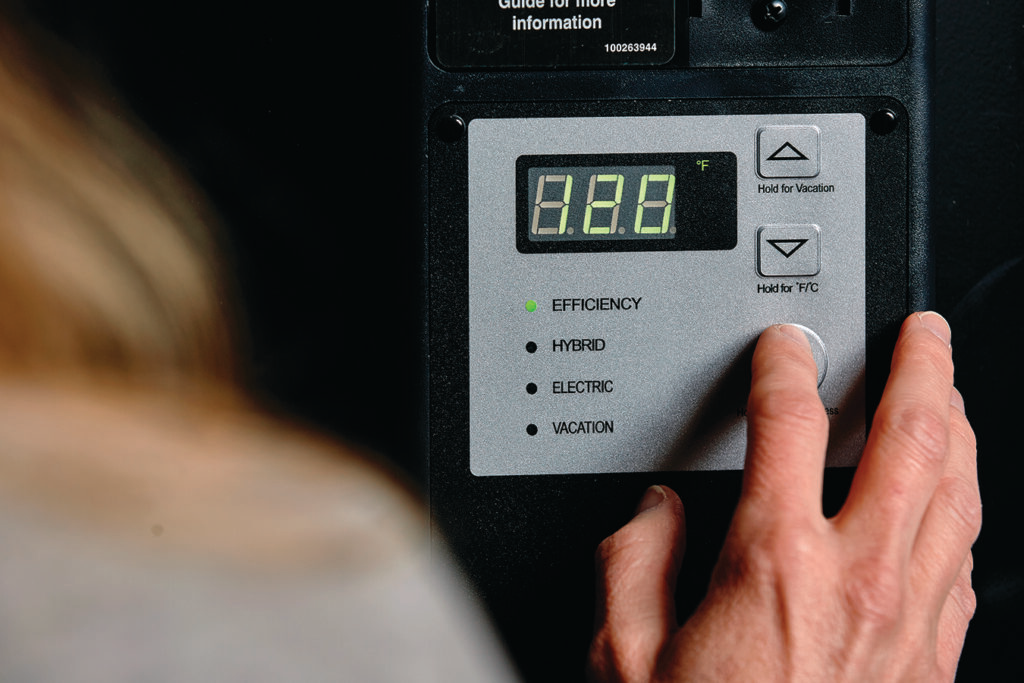Q: I’m looking for options to replace my old water heater. What should I choose to make my home’s water heating more efficient and save money?
Consider upgrading to an energy-efficient heat pump water heater. Heat pump water heaters—also called hybrid water heaters—use heat pump technology to heat water more efficiently than a standard electric storage water heater.
Think of them as a standard water heater with a heat pump on top. The heat pump heats the water two to three times more efficiently than the electric elements, but the unit still has the electric elements as backup, if needed.
Here are some details about their efficiency, how the units operate, installation considerations and when you should replace your old water heater.

Efficiency and operation
By moving heat instead of creating it, a heat pump water heater uses 60% less energy than electric storage water heaters. That can add up to hundreds of dollars a year and thousands during the life of the water heater.
Improved controls make it easy to set the desired temperature and programming, including vacation mode, which saves energy when you are out of town.
Some models offer Wi-Fi connectivity to be controlled by a smartphone from anywhere. Other helpful features include leak detection and automatic shutoff.
Installation considerations
A heat pump water heater uses heat from a room to heat water. It tends to make the space about 2 degrees cooler, which is something to consider before installation. Ideal placement is an unconditioned space, such as a garage or unheated basement. A heat pump water heater requires enough space around the unit to supply the air needed for efficient operation—about 750 cubic feet.
Heat pump water heaters tend to be slightly taller than storage water heaters and require additional clearance above the unit to access the filter for cleaning. If your water heater is in a conditioned space or a room smaller than the unit requires, venting might be a solution for your installation.
Another consideration is noise. A heat pump water heater generates about as much noise as a modern dishwasher, so it may not be a good solution if the water heater is located where sound could be a nuisance.
Installing a heat pump water heater is much like installing a standard electric water heater, except for the location of the cold-water inlet, which is located at the bottom of the unit.
Because moisture in the air condenses when it is drawn through the heat pump, it also requires a condensate drain that must be routed to a drain or pumped outside of the home.
Heat pump water heaters can replace electric, gas or propane water heaters. They typically require a 240-volt circuit, which might necessitate an electrical upgrade by a licensed electrician.

When to replace an old water heater
The life expectancy of a standard water heater is about 10 years. If your water heater is older than that or showing signs of failing, you may want to consider replacing it with a heat pump water heater before it fails.
It’s easier to find the product you want when it is not an emergency replacement. It also can be more expensive to replace it during an emergency. While heat pump water heaters are sold at a higher price than standard water heaters, the cost savings over time can offset the purchase and installation cost––and will result in a more energy-efficient home.
You also are likely to save by taking advantage of sales, rebates or tax credits. Check with your electric utility, state department of energy and federal tax information before purchasing a new water heater.
I installed a heat pump water heater in my home. I love it and can see how my energy use has decreased since installation. Now, if I can only figure out how to get my children to take shorter showers.
Miranda Boutelle is the chief operating officer at Efficiency Services Group in Oregon, a cooperatively owned energy efficiency company. She has more than 20 years of experience helping people save energy at home, and she writes on energy efficiency topics for the National Rural Electric Cooperative Association, the national trade association representing more than 900 local electric cooperatives.




